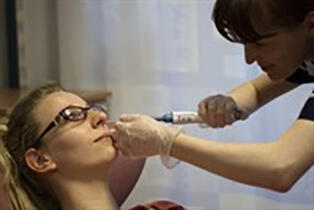
A study led by LSTM researchers and published in this week’s edition of theAmerican Journal of Respiratory and Critical Care Medicine has revealed that mucosal pneumococcal vaccination strategies may be important for vulnerable patient groups, particularly the elderly, who do not sustain carriage.
The study, led by LSTM’s Daniela Ferreira, wanted to investigate the immunizing effect of a single carriage episode by employing an experimental human pneumococcal carriage model. Seventy health adults were challenged and of those with carriage 10 were rechallenged intranasally with live 6B Streptococcus pneumoniae up to 11 months after clearance of the first carriage episode. Results showed that carriage resulted in increased immunological responses that conferred 100% of protection against recolonization.
The researchers postulate that carriage is beneficial and works as a natural boosting mechanism to sustain protective immunity against disease in adults. The study has important implications for current and future vaccination strategies, according to the researchers. This is enforced by an editorial in the Journal commenting on the importance of this study which highlights the need for vaccines based on nonpolysaccharide antigens as the large number of pneumococcal polysaccharide antigens is an inherent limitation for their use. Human nasal colonization with Streptococcus pneumoniae has the potential to develop into a universal pneumococcal vaccine.
The study was conducted by researchers of LSTM’s Respiratory Infection Group led by Professor Stephen Gordon; the Institute of Infection and Global Health of the University of Liverpool; The Institute of Child Health of University College London; the National Institute of Health Research Royal Liverpool and Broadgreen University Hospitals NHS Trust and Instituto Butantan in Sao Paulo, Brazil.

This research was funded by the Gates Foundation